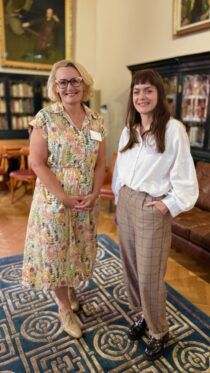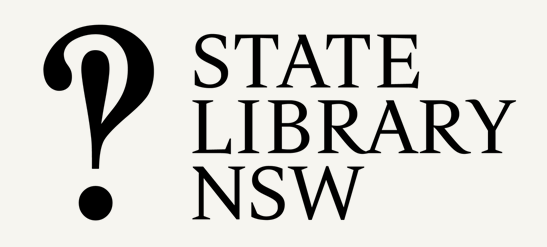 Coinciding with the NSLA Board meeting at the State Library of New South Wales in November was an event marking the culmination of celebrations for the fifth anniversary of the NED service, thanking publishers, writers and their peak bodies for their support of, and participation in the service over the last five years. Guest speaker, Lucy Hayward, CEO of the Australian Society of Authors, spoke eloquently about legal deposit and NED and what it means for Australian writers.
Coinciding with the NSLA Board meeting at the State Library of New South Wales in November was an event marking the culmination of celebrations for the fifth anniversary of the NED service, thanking publishers, writers and their peak bodies for their support of, and participation in the service over the last five years. Guest speaker, Lucy Hayward, CEO of the Australian Society of Authors, spoke eloquently about legal deposit and NED and what it means for Australian writers.
A Birthday Speech for NED
“Good evening to this national collection—albeit an in-person rather than a digital one—of librarians, publishers, cultural workers, authors, and readers.
It feels both fitting and paradoxical to celebrate the 5th birthday of the National Edeposit Service—something so innovative and new—against the backdrop of legal deposit, a tradition that spans hundreds of years.
And yet, here we are, standing on Gadigal land, where the oral tradition of keeping and sharing stories is immeasurably older—stretching back thousands and thousands of years.
NED represents a profound transformation. It’s a partnership between libraries and publishers, a reimagining of how we undertake the vital, shared work of maintaining and safeguarding our national stories.
[NSW State Librarian, Caroline Butler-Bowdon] has spoken about the significance of this task for librarians and the vast scale of these collections that libraries preserve. So tonight, I will try to speak for the authors.
For librarians, legal deposit often marks the beginning of a process. Once upon a time, print books—and now digital files—would arrive like a Christmas bounty. Librarians would summon their expertise and their rigor to preserve and protect what had been received.
For authors, however, regardless of what it is they are writing, legal deposit and NED often mark the end point of a long, deeply personal journey. The legal deposit represents a moment of completion, a destination finally reached.
At its heart, a book is a soaring creature of the imagination.
It begins as an author’s private journey—an exploration of a new world, topic, or even fragment of themselves. It is born out of a moment of freedom within the self.
But once conceived, this creature must be contained and delivered. Authors wrestle their raw ideas into a coherent literary form, editors bring their scrutiny, publishers their commercial nous. A book is born of many hands.
Despite its imaginative origins, literature is far from an unregulated realm. As a book takes shape, it is carefully structured into a physical (or digital) form. Metadata is added, an ISBN is assigned, blurbs and PR materials drafted, interviews and festival appearances planned. A copy is lodged with legal deposit.
And while that sounds like just another administrative step, for many authors, legal deposit is the moment when their work is preserved—not just for today but for the future. In joining the corpus of over 140 million books published throughout human history, their creation becomes a lasting contribution, a point of pride and achievement.
But a book does not stop there. Its second life begins when it enters the minds of its readers. And this is where NED proves invaluable.
We live in a time where books are more disposable than ever. Since Allen Lane placed a penguin on a book spine in 1935 and launched the paperback age, books have become physically more fragile. New paper, bindings and glues make books cheaper to produce, but shortened attention spans, three-month frontlist window, and the demise of the personal library – thanks Marie Kondo – make them easier to forget.
Yet NED—and legal deposit more broadly—ensures that books are not lost to time. It offers every book the chance of a third, fourth, or fifth life, even if its moment of recognition comes decades later.
Legal deposit allows researchers, far removed from a book’s initial publication, to rediscover and reanimate it for new readers.
[NSLA Executive Director Simon Polson] recently shared with me an illuminating example: the work of the State Library’s 2020 Nancy Keesing Fellow, Dr. Sophie Robinson. Her project, Lesbian Sydney in the 1990s, relied heavily on print copies of Lesbians on the Loose, a long-running magazine acquired under legal deposit. What might otherwise have been lost becomes a lit window onto an otherwise obscured past.
Looking forward, consider the Voice referendum of 2023. In two decades, researchers may turn to NED to uncover, via the dozen or so Australian books published on the topic last year, the depth of feeling and sense of an opportunity lost. NED will ensure that future scholars can seamlessly recover these works and understand the national conversation of our time.
This is why NED matters. It preserves our collective imagination, our shared history, and the stories we tell ourselves about who we are.
So tonight, let us celebrate. To all of us—authors, researchers, publishers, librarians, and those who have the vision to support this essential work—congratulations.
And, of course, a very happy birthday to NED.”
© Lucy Hayward, 2024. Reproduced with permission.










